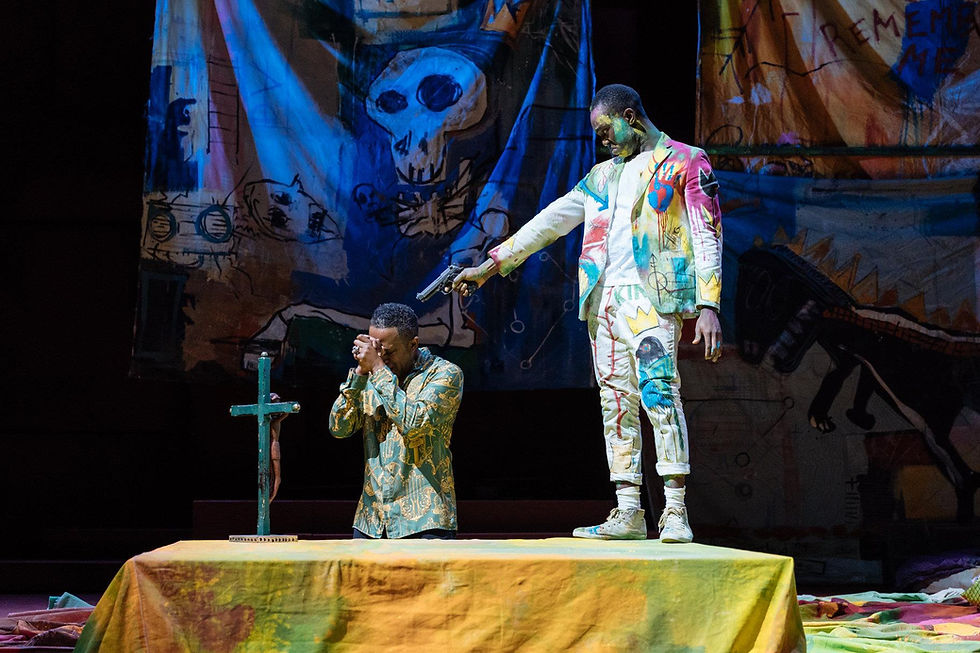Multifaceted and Challenging: Lorraine Hansberry’s ‘Les Blancs’
- Becky Golding

- Jul 9, 2020
- 3 min read
Updated: Aug 3, 2020

‘Once we wished merely to go without passes, the constant humiliation. We marched in silence, without weapons, without hatred. We stood. We prayed our Christian prayers! Your Christian prayers. We wrote petitions and editorials. We sent our emissaries to Europe. We tried to negotiate on our knees! We begged, and when we were not shot, we were ignored. And we were not yet begging for freedom, but for concessions - crumbs from the banquet table of imperialism - the right to live unharmed. Where were you then? Why do you [white people] all need it so – this absolute longing for my hatred? I do not hate all white men, but I desperately wish that I did, because it would make everything infinitely easier.’
The political timeliness of Lorraine Hansberry’s Les Blancs, filmed at the National Theatre’s Olivier stage in 2016, cannot be denied. The play is set in an unnamed African village. Christian missionaries have established a hospital to provide medical aid for the native population and a church to promote their religion. Charlie Morris (Elliot Cowan), a journalist who sees the world through rose-tinted spectacles, has been sent to report on the success of the mission. Concurrently, Tshembe Matoseh (Danny Sapani), a well-travelled businessman who now lives in London with his European wife and son, returns home because he has been informed by his brother that their father is seriously ill only to find his homeland simmering with racial tension. The vast majority of natives now boycott the mission to express their frustration about the lack of autonomy granted to them. Furthermore, a group of freedom fighters have taken radical action; they have begun slaughtering white families in the hope that this will lead to their grievances being heard. Major Rice’s (Clive Francis) oppressive countermeasures only escalate the situation. Tshembe is torn between wanting to protect the missionaries that were an integral part of his upbringing and supporting the rebel cause.
Designer Soutra Gilmour does a wonderful job of ensuring that Les Blancs is as visually striking as it is emotionally charged. The play’s opening sequence is thoroughly captivating, with the skeletal mission house on the revolving stage serving as a backdrop. Adam Cork does a superb job of punctuating the play’s action with the chorus of singing matriarchs, their harmonies getting progressively more haunting to match the increasingly intense atmosphere.

Hansberry’s writing has a beautiful lyricism to it. I appreciate how her characters give voice to a wide spectrum of opinions. Interactions between characters are insightful and powerful, especially those between Tshembe and Mr Morris. The majority of her characters are not clear-cut heroes or villains. Instead, they occupy a liminal grey area, highlighting the complexity of discourses on such sensitive matters. For example, Anna Madeley plays Dr Marta Gotterling, a mission doctor who has devoted the majority of her life to helping Africans. Yet, Gotterling keeps the reverend’s prized cello chained up because she believes the native tribespeople have dubious morals. Therefore, Hansberry highlights how people that firmly believe they are doing good can still be part of the problem. Sapani’s performance as Tshembe is highly accomplished. His impassioned rages are tempered by moments of contemplation, highlighting his inner conflict as a man who was once close to the missionaries yet cannot ignore the potent voices of the freedom fighters imploring him to join their cause. However, not all of her characters have this degree of nuance. Major Rice’s characterisation is far from subtle. He’s like a broken record, repeating over and over that he’s ‘not a racist’ even though he abuses the native people in broad daylight. Although his unrelenting callousness is likely to illicit a strong emotional response from the audience, the writing of his character could have been a little less heavy handed.

I have a few other grievances. All the black women in the play were either there to set the atmosphere or were purely symbolic. Not a single black female character spoke throughout the entirety of the play which I felt was a real oversight, as it would have been great to hear their perspectives. I felt that the formulaic metaphor of Africa as a lithe, emaciated, scarcely clothed woman was unhelpful and merely reinforced an anachronistic stereotype.

Les Blancs is a heavy-going yet important piece that examines past and ongoing racial issues. The cast give anguished and impassioned performances that do justice to Hansburry’s eloquent and insightful prose. It does what theatre is meant to do: make you think. I would rate Lorraine Hansberry’s Les Blancs four out of five stars.
Watch the trailer here: https://www.youtube.com/watch?v=DUr3yzmDUFY



Comments